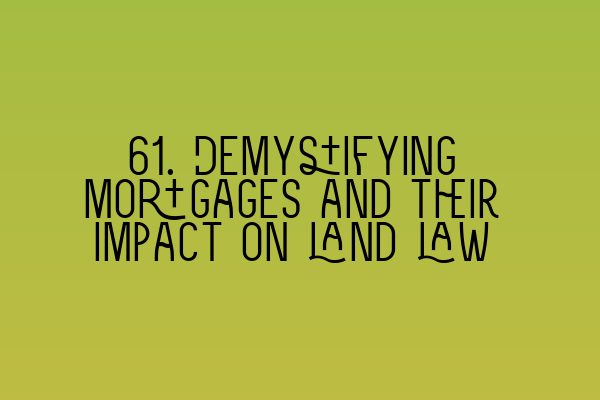Demystifying Mortgages and Their Impact on Land Law
Welcome to the SQE Property Law & Land Law blog, where we aim to educate and provide expert insights into various aspects of property and land law. In today’s post, we will be demystifying mortgages and exploring their impact on land law.
A mortgage is a legal agreement between a borrower and a lender that allows the borrower to obtain funds to purchase a property, with the property itself serving as collateral for the loan. Mortgages play a crucial role in property transactions, and understanding their complexities is essential for solicitors practicing property law.
The Basics of Mortgages
When a borrower secures a mortgage, the lender places a lien on the property, which essentially acts as a legal claim on the property until the loan is repaid. This lien ensures that the lender has a legal right to seize the property in the event of default by the borrower.
Mortgages are typically long-term loans with fixed or adjustable interest rates. The repayment period can span several years, and the terms of repayment are laid out in the mortgage agreement. These terms include the principal amount, interest rate, payment schedule, and any additional fees or charges.
In land law, mortgages have a profound impact on property ownership. Once a mortgage is registered against a property, it becomes an encumbrance on the title, meaning that any subsequent buyer or lender must take the mortgage into consideration. This ensures that the lender’s interests are protected even if the property changes hands.
Types of Mortgages
There are various types of mortgages available, each with its own advantages and considerations. Some common types include:
- Fixed-Rate Mortgages: These mortgages have a fixed interest rate for the entire loan term, providing borrowers with predictable monthly payments.
- Adjustable-Rate Mortgages (ARMs): ARMs have an initial fixed rate for a specific period, after which the interest rate adjusts periodically based on market conditions. These mortgages offer flexibility but come with some uncertainty.
- Interest-Only Mortgages: With an interest-only mortgage, borrowers only pay the interest on the loan for a set period, after which they must begin repaying the principal amount as well. These mortgages offer lower initial payments but require careful financial planning.
- Buy-to-Let Mortgages: These mortgages are specifically designed for individuals purchasing properties with the intention of letting them out. The terms and conditions for buy-to-let mortgages differ from those of residential mortgages.
It is crucial for solicitors to understand the nuances of each mortgage type to provide the best advice to clients and ensure compliance with relevant legal requirements.
The Impact of Mortgages on Land Law
As mentioned earlier, once a mortgage is registered against a property, it becomes an encumbrance on the title. This means that any subsequent buyer, lender, or tenant must consider the mortgage’s existence and terms.
When representing clients in property transactions, solicitors must conduct thorough due diligence to identify any existing mortgages or other encumbrances on the property. This information helps buyers and lenders make informed decisions and avoids potential legal disputes in the future.
Furthermore, solicitors play a vital role in ensuring that the mortgage documentation is accurate, legally binding, and properly executed. They review the terms of the mortgage agreement, verify the lender’s legal authority, and ensure compliance with relevant laws and regulations.
Additionally, in case of default by the borrower, solicitors assist lenders in enforcing their rights and potentially initiating foreclosure proceedings. This involves navigating the complex legal landscape surrounding mortgage enforcement and representing the creditor’s interests in court.
Understanding mortgages and their impact on land law is crucial for solicitors practicing property law. With a comprehensive knowledge of mortgage types, legal implications, and enforcement procedures, solicitors can protect their clients’ interests and provide valuable advice throughout the property transaction process.
If you are considering a career in property law or are preparing for the SQE exams, be sure to check out our related articles:
- SQE 1 Practice Exam Questions
- SQE 1 Practice Mocks FLK1 FLK2
- SQE 2 Preparation Courses
- SQE 1 Preparation Courses
- SRA SQE Exam Dates
At SQE Property Law & Land Law, we specialize in providing expert guidance and support for aspiring solicitors. Our comprehensive courses and exam preparation materials will help you navigate the complex world of property law with confidence. Contact us today to learn more!
